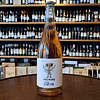Rosé Pét-Nat (Pétillant Naturel) of white and red
grapes (60% - 40%), from different plots between
60 to 80 years old, cultivated in clay soils.
Grape Varieties: Blend of more than 15 native varieties based on Tinta Gorda, Malvasia, Bastardo Preto, Bastardo Branco, Formosa and Verdelho.
Vinification: Foot-trodden and direct pressing. Fermentation in fiber thank and bottling before completing fermentation. The final fermentation in the
bottle produces natural gas and sediment which is removed by manual disgorgement.
Ageing: 6 months in bottle then
dégorgement.
Uva is a village of 50 inhabitants, sheltered in the hollow of the mountains, surrounded by dovecotes and where the inhabitants cultivate small plots of vines for their own consumption.
Menina d'uva is the project I started in 2017. I left Paris for my parents' village, Uva, for the love of the land, the vineyards and rural life. Today, and after having hardly convinced the inhabitants, I rent 10 small plots of old vines (3ha in total), for an annual production of 10,000 bottles.
The vines are between 40 and 100 years old, and were planted with a mixture of traditional grape varieties from the region. Forgotten varieties, deeply adapted to the climate and soil. At an altitude of 550m, the vineyards rest on schist or clay soils and benefit from a continental climate, characterized by long cold winters and very hot summers.
Viticulture is natural, I use compost to feed the soil and I don't do any treatment (due to the very arid climate, it's possible!). This allows me to focus fully on soil and plant recovery work. As these vines are neglected and previously plowed, the pruning work is more laborious and the restoration of soil life is slow, but fundamental for the elaboration of a terroir wine.
Winemaker: Aline Domingues



